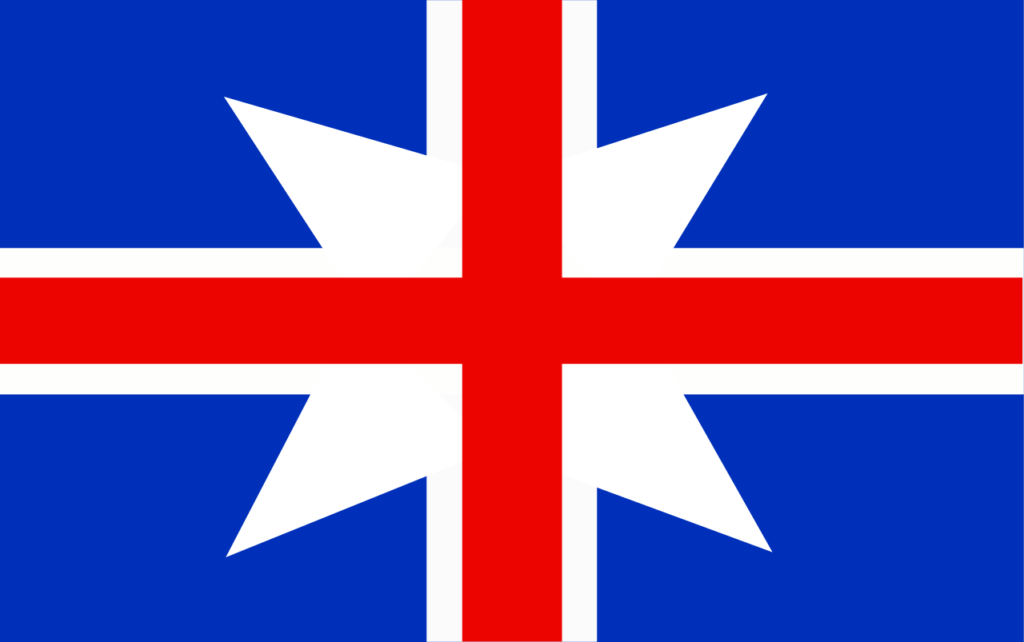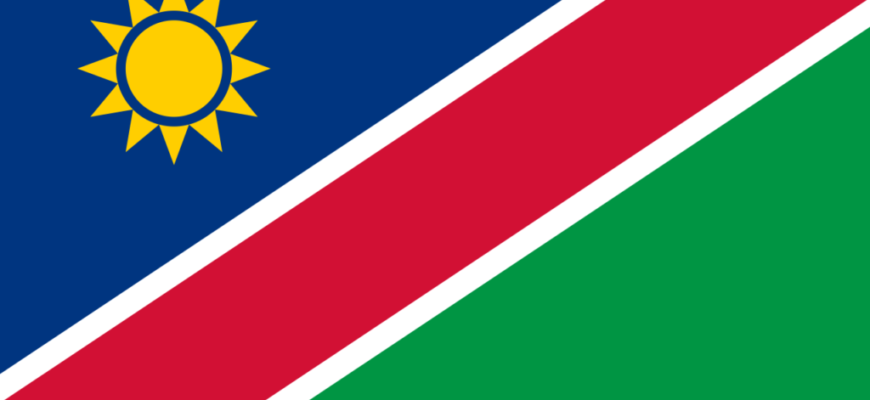Namibia, one of Africa’s oldest states, which was dominated for hundreds of years by other, larger and more powerful states, and only gained independence in the late eighties, changed several symbols before getting the one that exists today.
This is what the modern Namibian flag looks like:

History of the flag
The first flag, the symbol of the people, was modeled on the British flag in 1864 by an indigenous tribal chief. In those years began the colonization of the state by the Cape Colony, the first colony of Holland.

From 1868 to 1871 the natives created their own square-shaped symbol, with three squares, black, red and white. It had been in use since 1872.

A little later, in 1914, when Namibia was subjected to Germany, a new flag was designed, which was not adopted because of the outbreak of World War I. After the First World War the republic was subordinated to South Africa and had no flag of its own.

From 1884 to 1914 Namibia was part of the German Colonial Society of Southwest Africa.
In 1962, a prototype of the modern cloth was created. At the same time, flags were designed for the individual homelands, the ethnic parts of the republic, each with their own colors and symbols reflecting their individuality. At that time, some homelands were given the status of states and the possibility of autonomous government.
The national flag of the Republic of Namibia was adopted in the Constitution created in connection with the declaration of independence in 1990.
Description
It consists of three bands, on the one in the middle, on top of which lies another, a fourth. At the staff, in the upper left corner, is the sun, which has twelve rays. Its diameter is a third of the width of the cloth, and its axis is a fifth of the width from the staff. Between the sun and its rays is a ring of blue, its width equal to one-tenth of the radius of the sun.
Namibian flag colors
Blue, red, green, white and yellow.
Meaning of colors and flag symbol
- Blue is the color of the sky and the Atlantic Ocean, water, which is important in a dry climate.
- Red — the image of the people, their heroism and desire to achieve the welfare of the country.
- Green — the embodiment of natural resources and agriculture.
- Yellow — the Namib desert.
- White is the color of unity and peace.
- The sun on the flag symbolizes life energy.
Other flags of Namibia
In the year of the appearance of the official flag, another flag was created — the president’s flag. It has a yellow triangle with the country’s coat of arms, flanked by blue and green triangles.

The police flag is a blue cloth with a red stripe, as on the official flag, which, by the way, is presented in the upper left corner, with the police symbol in the lower right.

Political parties of the state also have their own symbols:
- Democrat Congress;

- Caprivi African National Union;

- The Movement for Democracy and Progress.

Both in the colonial and pre-colonial periods Namibia had its own unique features, which are preserved in the country’s flag to this day.
General information about Namibia
| Official language | English |
| Capital | Windhoek |
| Territory | 825 418 km² |
| Population | 2 533 794 people |
| Currency | Namibian dollar |
| Phone Code | +264 |










Недавно я узнала, что флаг Намибии символизирует природу страны. Я была в Намибии несколько лет назад и помню, как останавливались рядом с пустыней и смотрели на бескрайние пейзажи. Флаг действительно отражает богатство культуры и природы этого удивительного места.
I remember visiting Namibia and seeing the flag waving proudly at a local festival. It was such a vibrant representation of the country’s spirit! I’m so grateful for the warm hospitality and the stunning landscapes. That trip truly opened my eyes to the beauty of Namibia.
I saw Namibia’s flag on a dusty market stall during my trip; the diagonal band and sun caught my eye. As a vexillology newbie, I felt geeky and grateful for that moment of connection. Thanks for the cool summary — Mary
As a guy who loves world flags, seeing Namibia’s flag always gets me pumped! The colors and sun design totally stand out. I remember spotting it at a soccer game once and it sparked such pride among fans. Flags seriously bring people together, can’t get enough of that vibe!
As a woman, I once saw the Namibian flag waving proudly during a cultural festival. It reminded me of the rich history and vibrant spirit of the country. Flags really do tell stories, and Namibia’s design always stands out to me—so fresh and meaningful!
As a woman who loves geography, I remember spotting Namibia’s flag during a wildlife trip. The bright colors and unique design made it memorable. It’s amazing how flags reflect a country’s spirit and history, just like Namibia’s vibrant landscapes and culture. Truly eye-opening!